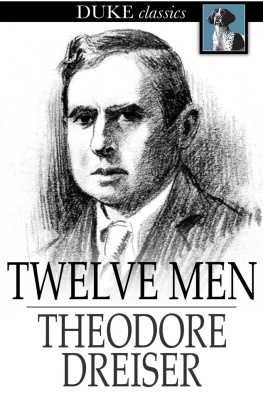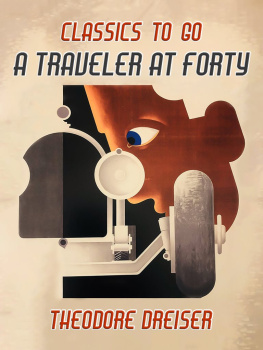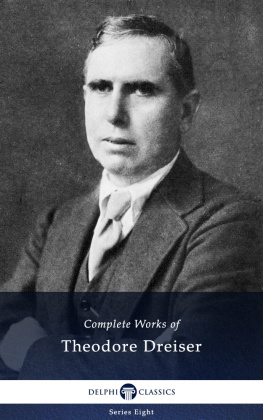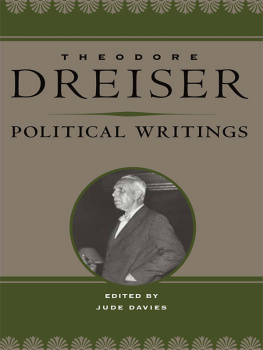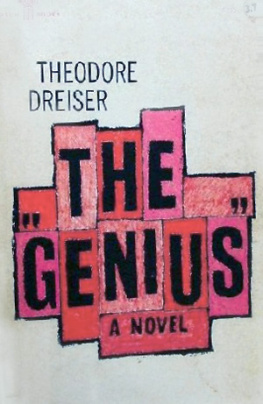TWELVE MEN
* * *
THEODORE DREISER
*
Twelve Men
First published in 1919
ISBN 978-1-62012-792-6
Duke Classics
2012 Duke Classics and its licensors. All rights reserved.
While every effort has been used to ensure the accuracy and reliability of the information contained in this edition, Duke Classics does not assume liability or responsibility for any errors or omissions in this book. Duke Classics does not accept responsibility for loss suffered as a result of reliance upon the accuracy or currency of information contained in this book.
Contents
*
Peter
*
In any group of men I have ever known, speaking from the point of viewof character and not that of physical appearance, Peter would stand outas deliciously and irrefutably different. In the great waste of Americanintellectual dreariness he was an oasis, a veritable spring in thedesert. He understood life. He knew men. He was freespiritually,morally, in a thousand ways, it seemed to me.
As one drags along through this inexplicable existence one realizes howsuch qualities stand out; not the pseudo freedom of strong men,financially or physically, but the real, internal, spiritual freedom,where the mind, as it were, stands up and looks at itself, faces Natureunafraid, is aware of its own weaknesses, its strengths; examines itsown and the creative impulses of the universe and of men with a kindlyand non-dogmatic eye, in fact kicks dogma out of doors, and yetdeliberately and of choice holds fast to many, many simple and humanthings, and rounds out life, or would, in a natural, normal, courageous,healthy way.
The first time I ever saw Peter was in St. Louis in 1892; I had comedown from Chicago to work on the St. Louis Globe-Democrat, and he wasa part of the art department force of that paper. At that timeand henever seemed to change later even so much as a hair's worth until hedied in 1908he was short, stocky and yet quick and even jerky in hismanner, with a bushy, tramp-like "get-up" of hair and beard, mostswiftly and astonishingly disposed of at times only to be regrown atothers, and always, and intentionally, I am sure, most amusing tocontemplate. In addition to all this he had an air of well-being, forceand alertness which belied the other surface characteristics as anythingmore than a genial pose or bit of idle gayety.
Plainly he took himself seriously and yet lightly, usually with an airof suppressed gayety, as though saying, "This whole business of livingis a great joke." He always wore good and yet exceedingly mussy clothes,at times bespattered with ink or, worse yet, even soupan amazinggrotesquery that was the dismay of all who knew him, friends andrelatives especially. In addition he was nearly always liberallybesprinkled with tobacco dust, the source of which he used in all forms:in pipe, cigar and plug, even cigarettes when he could obtain nothingmore substantial. One of the things about him which most impressed me atthat time and later was this love of the ridiculous or the grotesque, inhimself or others, which would not let him take anything in a dull orconventional mood, would not even permit him to appear normal at timesbut urged him on to all sorts of nonsense, in an effort, I suppose, toentertain himself and make life seem less commonplace.
And yet he loved life, in all its multiform and multiplex aspects andwith no desire or tendency to sniff, reform or improve anything. It wasgood just as he found it, excellent. Life to Peter was indeed sosplendid that he was always very much wrought up about it, eager tolive, to study, to do a thousand things. For him it was a workshop forthe artist, the thinker, as well as the mere grubber, and without reallycriticizing any one he was "for" the individual who is able tounderstand, to portray or to create life, either feelingly andartistically or with accuracy and discrimination. To him, as I saw thenand see even more clearly now, there was no high and no low. All thingswere only relatively so. A thief was a thief, but he had his place.Ditto the murderer. Ditto the saint. Not man but Nature was planning, orat least doing, something which man could not understand, of which verylikely he was a mere tool. Peter was as much thrilled and entendered bythe brawling strumpet in the street or the bagnio as by the virgin withher starry crown. The rich were rich and the poor poor, but all were inthe grip of imperial forces whose ruthless purposes or lack of them madeall men ridiculous, pathetic or magnificent, as you choose. He pitiedignorance and necessity, and despised vanity and cruelty for cruelty'ssake, and the miserly hoarding of anything. He was liberal, material,sensual and yet spiritual; and although he never had more than a littlemoney, out of the richness and fullness of his own temperament he seemedable to generate a kind of atmosphere and texture in his daily lifewhich was rich and warm, splendid really in thought (the true reality)if not in fact, and most grateful to all. Yet also, as I have said,always he wished to seem the clown, the scapegrace, the wanton andthe loon even, mouthing idle impossibilities at times and declaring hisprofoundest faith in the most fantastic things.
Do I seem to rave? I am dealing with a most significant person.
In so far as I knew he was born into a mid-Western family of Irishextraction whose habitat was southwest Missouri. In the town in which hewas reared there was not even a railroad until he was fairly wellgrowna fact which amused but never impressed him very much. Apropos ofthis he once told me of a yokel who, never having seen a railroad,entered the station with his wife and children long before train time,bought his ticket and waited a while, looking out of the variouswindows, then finally returned to the ticket-seller and asked, "Whendoes this thing start?" He meant the station building itself. At thetime Peter had entered upon art work he had scarcely prosecuted hisstudies beyond, if so far as, the conventional high or grammar school,and yet he was most amazingly informed and but little interested in whatany school or college had to offer. His father, curiously enough, was aneducated Irish-American, a lawyer by profession, and a Catholic. Hismother was an American Catholic, rather strict and narrow. His brothersand sisters, of whom there were four, were, as I learned later,astonishingly virile and interesting Americans of a rather wild,unsettled type. They were all, in so far as I could judge from chancemeetings, agnostic, tense, quick-movingso vital that they weighed onone a little, as very intense temperaments are apt to do. One of thebrothers, K, who seemed to seek me out ever so often for Peter'ssake, was so intense, nervous, rapid-talking, rapid-living, that hefrightened me a little. He loved noisy, garish places. He liked to playthe piano, stay up very late; he was a high liver, a "good dresser," asthe denizens of the Tenderloin would say, an excellent example of theflashy, clever promoter. He was always representing a new company,introducing somethinga table or laxative water, a shaving soap, achewing gum, a safety razor, a bicycle, an automobile tire or themachine itself. He was here, there, everywherein Waukesha, Wisconsin;San Francisco; New York; New Orleans. "My, my! This is certainlyinteresting!" he would exclaim, with an air which would have done creditto a comedian and extending both hands. "Peter's pet friend, Dreiser!Well, well, well! Let's have a drink. Let's have something to eat. I'monly in town for a day. Maybe you'd like to go to a showor hit thehigh places? Would you? Well, well, well! Let's make a night of it! Whatdo you say?" and he would fix me with a glistening, nervous and what wasintended no doubt to be a reassuring eye, but which unsettled me asthoroughly as the imminence of an earthquake. But I was talking ofPeter.

